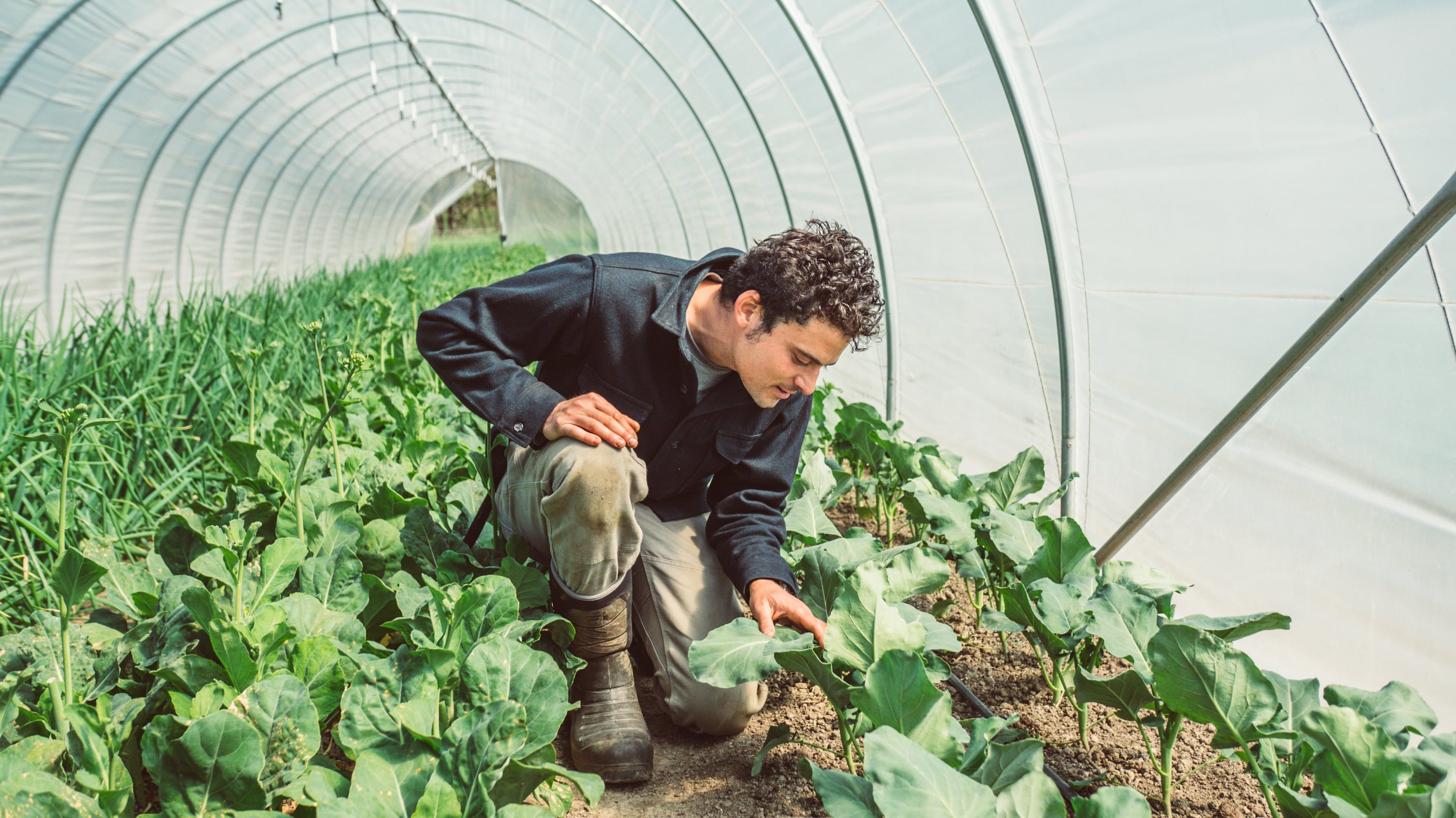
In The Dirt With Evan Chender
Evan Chender is really excited about two things this year: peppers and potatoes. “People don’t really understand potatoes,” he says. “If they've never had a freshly dug new potato, they think it's just a throw-away item. But potatoes with certain traits can be a transportive experience.”
Asheville chefs seek out Evan’s nom de plume, The Culinary Gardener, for the produce he grows exclusively for restaurants. He’s known for a tight client list (Cucina 24 and Table, example), a year-round growing season and a thoughtful business that keeps a hand in the soil and an eye on the horizon. With the release of our new glaze Fiddlehead, we’ve been wandering through woods and fields, and it only felt natural to spend some time with Evan on his farm. You won’t see a sign for it from the road—he likes his privacy. As we walked among rows of early tomatoes and lingered by the bergamot, Evan opened up about his self-taught journey from chef to farm owner, his temporary pandemic pivot that became surprisingly permanent, his favorite thing to cook after a long day, and the art of building a business.
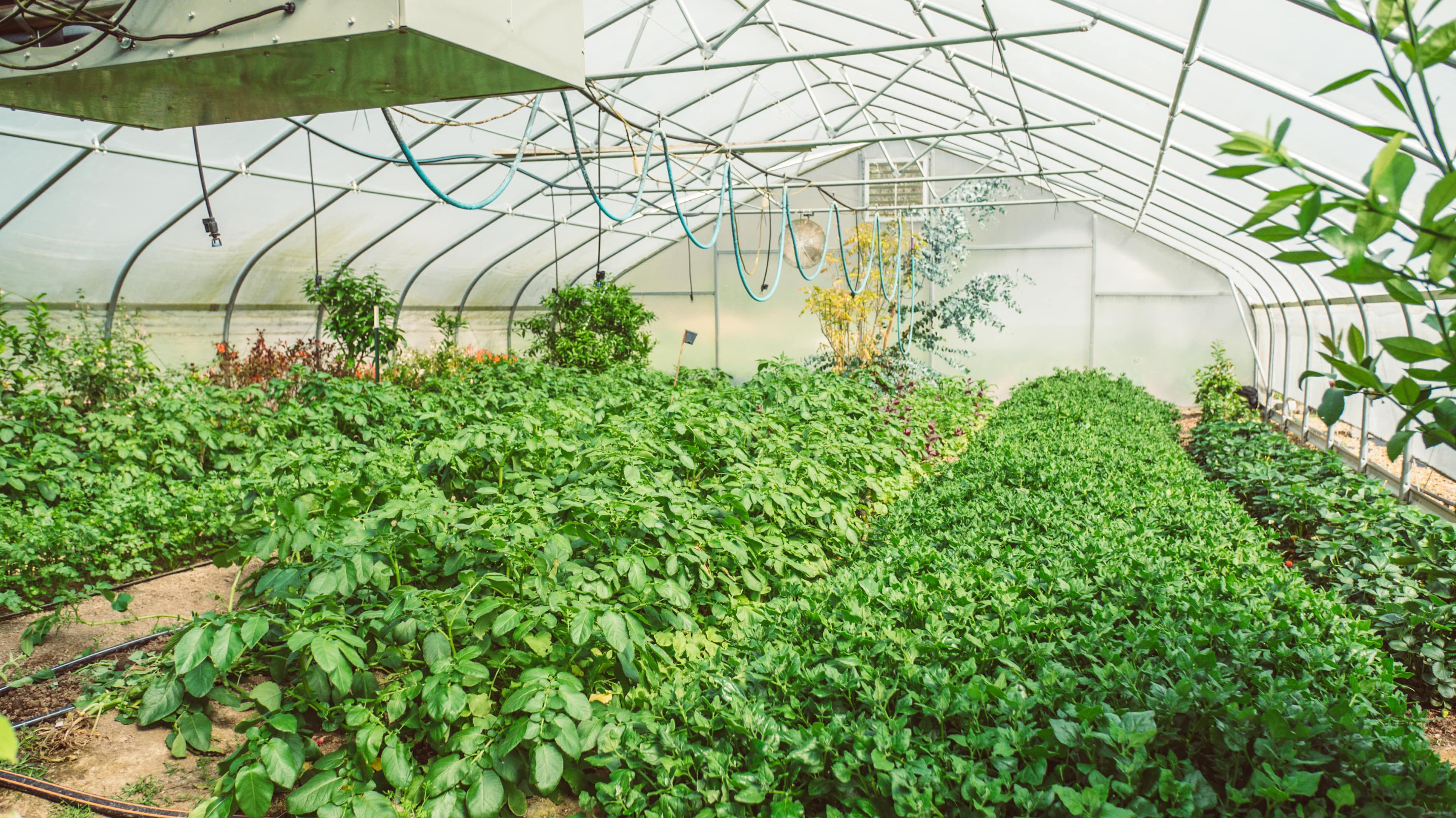
“Over here, we’ve got some lettuces, pink mizuna, some pea greens, some sprouting broccoli.”
Evan Chender, owner of The Culinary Gardener, walks us among the tight rows in one of his farm’s high tunnels. Threading among the rows, around our ankles, are Evan’s two Dachshunds, Lyle and Maple. They follow him closely around the farm and right now, we’re all basking in the sun-generated heat of the tunnel, keeping us out of the cold spring wind. There are three of us from East Fork, and while Evan is a friend of the brand, we’ve rarely seen each other (or others!) since the pandemic began, and it’s good to catch up. There’s optimism in these last days of April, with warm weather and new things on the horizon.
When it comes to farming and owning a business, Evan is largely self-taught. After an informative “and very formative” 6-month apprenticeship at Stone Barns in New York right out of college in 2010, Evan dove head first into experimentation, observation and understanding the art and science of farming. “It's been harder because I've had to figure it all out myself, and generally at the expense of making mistakes,” he says. “It's a slower process, but at the same time I think it's allowed me to create the business that it is now, because I never felt like I had boundaries.”
Evan started Culinary Gardener in 2013. “Up until that point, I had done some farm work, but I mostly worked in kitchens. I was coming from working in a kitchen in the area, but I had this opportunity to use this person's backyard for free, and to do what I wanted with it.”
Evan used the tiny backyard space to fill a niche: selling exclusively to restaurants. At the time, larger regional farms such as Gaining Ground and Ten Mile Farm–much larger than Evan’s fifth of an acre–dominated the market. “I needed to have a style that distinguished me, so I sold specialty and unique items that chefs in the area would not be able to find from anyone else. I could get some market share, even though my quantities were pretty small.”
And he knew exactly where to start.
Using his apprenticeship knowledge and time working in kitchens, Evan started offering tiny greens, tiny roots (radishes, turnips), little gem lettuces, and edible flowers: produce that played a garnish role, with a quick turnaround and a small footprint. “Accounts would use a pint or a quart [of flowers] a week, so if I had five or six, I could distribute them to different spots,” he says.
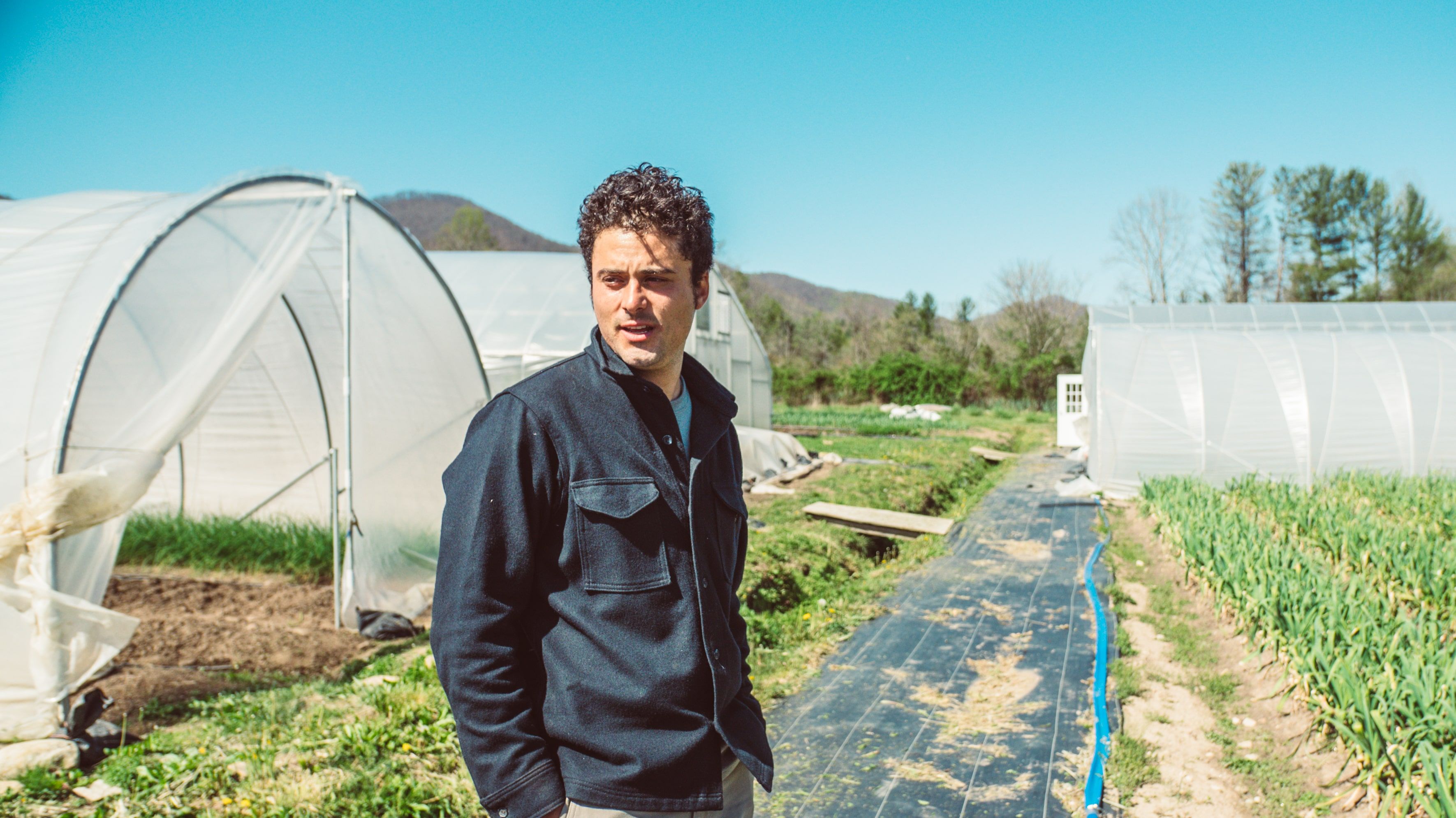
Fast forward to 2022. Culinary Gardener now sells to restaurants 51 weeks a year. They’re one of the bigger players in Asheville. Evan’s team has grown to four full-time employees and two part time employees. The one-fifth backyard acre is now a maxed-out piece of land in the beautiful Reems Creek valley, and they’re also leasing the property next door. “Chefs see that my quality of product is really good, and I'm really reliable. They want more quantity of real stuff they can use on their menus and dishes.”
Our group of three walk with Evan as we enter another high tunnel. “We have lettuces here, and we have beets right here,” he points out. “This is another round of salad turnips.”
And the edible flowers? Before the pandemic, Evan’s farm grew two dozen different varieties over the course of a year. They’ve moved away from it significantly, only growing two varieties.
Now on Evan’s sell sheet: artichokes, kale, radicchio, tomatoes, zucchini. “It’s tricky because we made our name for ourselves with all the diversity we offer, but now we have such high demand to have the quantities everyone wants for all the different things,” he explains. “We’re at a crossroads. We have to ask ourselves: what unique vegetable do we drop to make more space for the things that are popular? What will people miss? How do you whittle it down?”
Evan found himself at another crossroads in 2020, when the pandemic hit. Restaurants were shuttered, and after a few weeks, it was clear it would last longer than anyone anticipated. For the first time, Culinary Gardener opened itself to the public with its first CSA offering.
“It saved our ass,” he says and we laugh, while silently acknowledging the collective toll the pandemic has taken, the pivots and hard decisions we’ve all had to make. “Since then, I realized there were a lot of benefits to the CSA. This year, we have 35 members.”
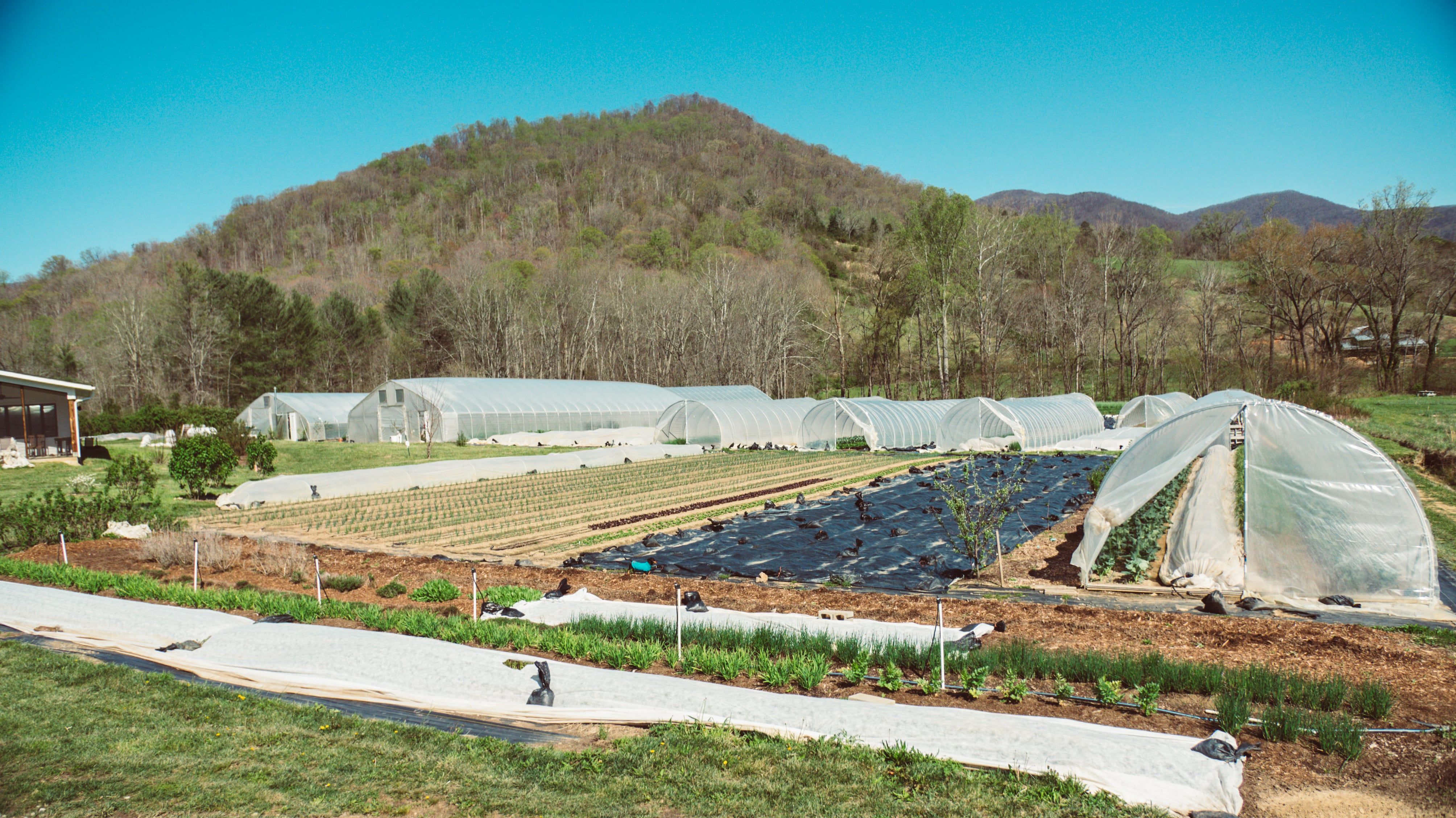
We pass a plot of onions. Lyle and Maple are on some kind of hunt, noses on the ground, getting closer to a mole hole. Evan points to the property next door that they’re leasing. It’s a two-acre field but most of the land is too wet to grow in, so they’re working on building up the soil. A half-acre is in use. “To have another half-acre is significant for business,” he says.
Cultivating soil and planning crops is challenging here in western North Carolina, because we live in a temperate rainforest. Evan has paid attention to every season over the last 10 years. “There is no winter or spring that’s the same,” he says. “We can have a mild winter, we can have a freezing winter, we can have a wet winter, we can have a very dry winter. We can have a long winter, a short winter.”
It takes a toll in the era of rapid climate change. The biggest challenge? Really late spring frosts, like the one we’re experiencing as we visit with Evan. “Last year [the frost] was April 22nd, the year before was May 9th, and this year it's April 19th. That's a lot of extra work for us, and potential loss of product.”
With such high demand and need for production, everything needs to work.
There is very little room for plant loss or fluctuation that kills the quality of the product. “For example, we grow broccoli in the spring,” he says. “If they get a lot of high temperature fluctuations, like this past Saturday when it was almost 80 degrees, and then three days later it's literally freezing, they start to make heads when they're really small, and so they have no energy in their roots, or size of leaf to create a big head. The broccoli is ruined. The temps didn’t kill it, but made it essentially unmarketable. So, it's a fail. We lost it. Rip it out.”
Chefs want the best broccoli. So they go to Evan. What used to be a commodity, a question of what can we get for the cheapest price is now where can we get the best product available?
Chefs' purchasing habits have also changed since COVID. They're more focused on wanting to make tasty food that's going to sell, and not spend money on frivolous garnish. And that's where the edible flowers fall into play, except for the two ones that Evan grows: marigolds and nasturtiums. Those are still in high demand because they're flavorful, and can be used in different ways, with a long season for picking.
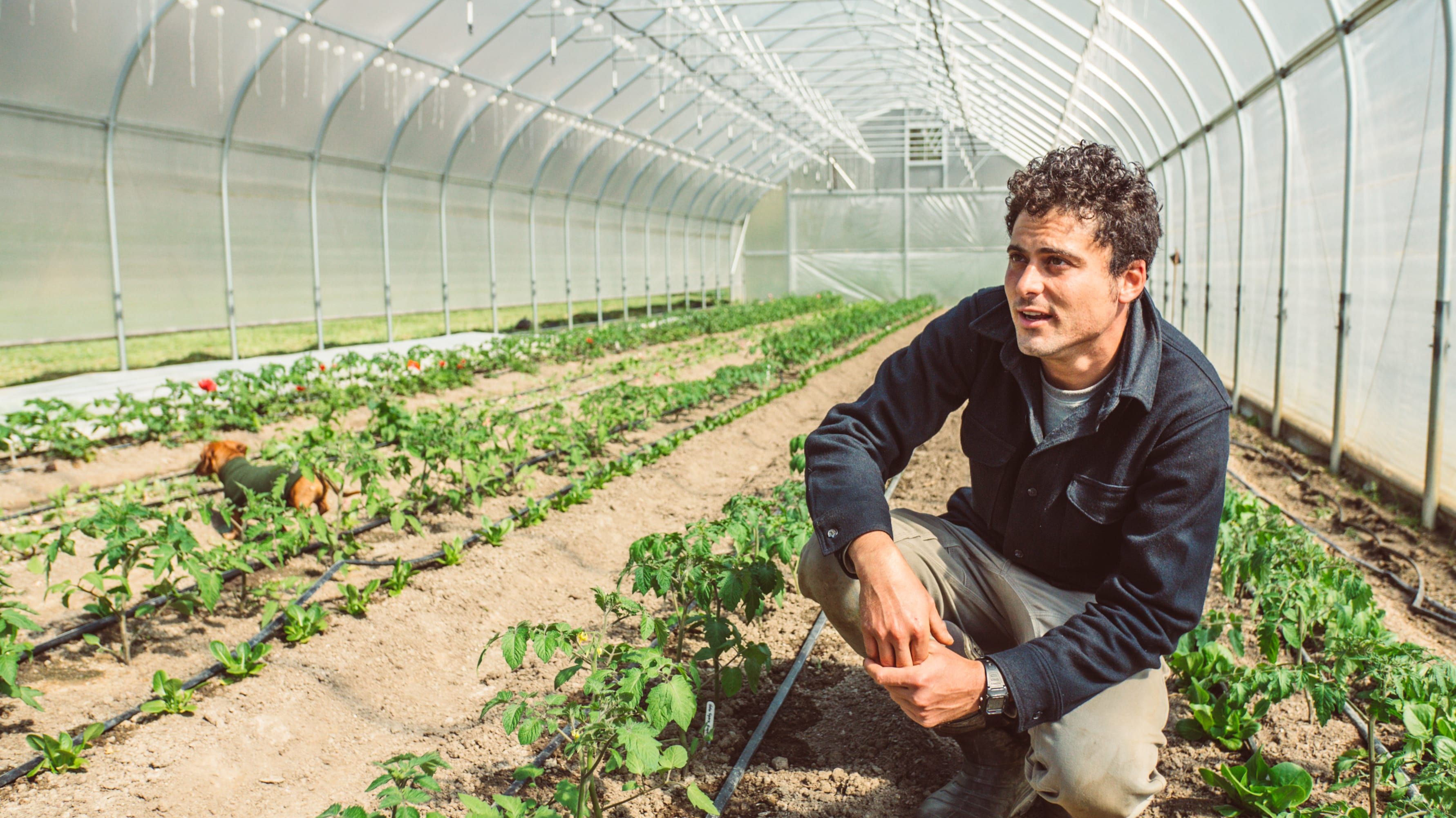
As we make our way to the greenhouse where Evan is growing citrus, I ask him what is exciting to him to grow. He smiles. “I'm probably not going to give you the answer that you're looking for,” he says. “But what's exciting me right now is to just have high production of all kinds of things, and have everyone be satisfied with what they're getting.”
He pauses.
“But if we’re going to be specific, I love growing potatoes. I love fresh dug new potatoes.”
“Terrible answer,” I laugh.
As we walk, Evan points to the greenhouse where he recently planted potatoes in February, a month earlier than they would normally do it. They just started harvesting them.
We step into the greenhouse, where the Culinary Gardener has experimented with citrus since 2019. It’s exciting to see Meyer lemon trees, lime leaves, mandarins and a hybrid yuzu (sudachi), as well as a bergamot orange tree, a rare treat here in the Appalachian mountains.
So, what is Evan’s philosophy around business? What does growth mean for the farm and how much is “enough?”
“For the last five years, I've really put my accounts [chefs and restaurants] first. Anything the farm needs, anything the chefs want, I did no matter what it did to myself personally.” He pauses. “Now five years later, I'm about to turn 34. I've just tried to push, push, push. But now, I'm realizing I can't push enough no matter what to ever get to the place where accounts say, ‘We're so happy with you, and everything you're doing, and we're good. We're satisfied.’ When I’m 40, what am I going to have to show for myself? I need to recalibrate what I'm willing to do.”
We step out of the greenhouse and Evan continues. “I'm realizing now that I should really focus on what works for the business and for me. I’ve been the only vegetable supplier for some accounts since December. It's great for sales, but it's a lot of pressure to have those expectations of us. When other farms that sell to restaurants in Asheville take three months off, no one's beating on their door, asking, 'Where are you?' We've set this precedent of year round sales, high production all year for our main clients, and we've created a monster.” He laughs.
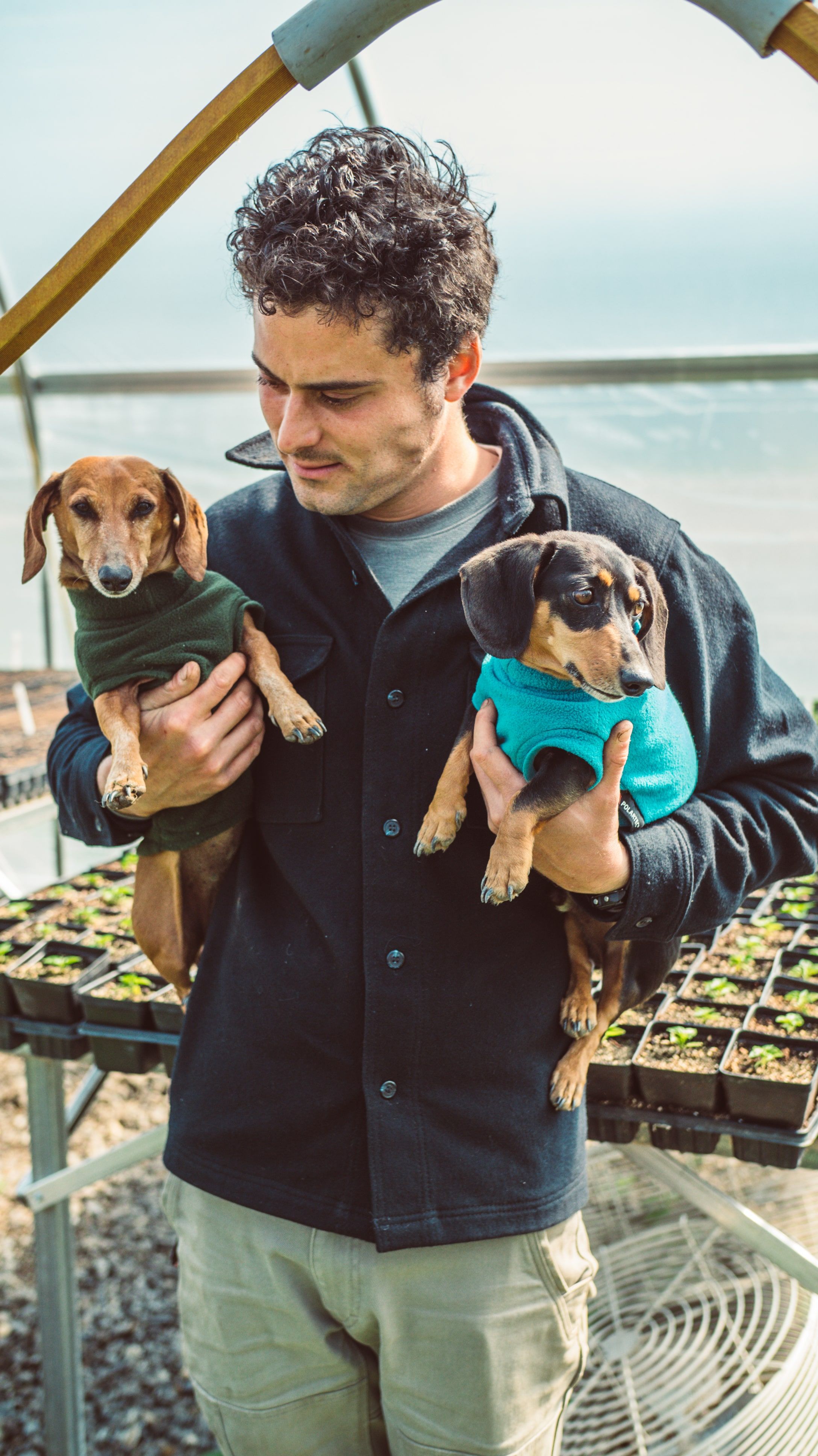
The newest building on the farm, the propagation house, was built last spring. We step inside to tables full of baby pepper plants and seedlings. Evan’s team used to start propagation in the same greenhouse where the citrus are, but have outgrown the space.
Peppers will grow in the propagation house for three months before they plant them out. Behind radicchio, “peppers are our number two in sales.” Sweet peppers, frying peppers, hot peppers…Evan estimates they have around 1,300 pepper plants.
Lyle and Maple sit at Evan’s feet. He picks up one Dachshund in each arm and holds them as he talks excitedly about a light greenm skinny variety called the Python frying pepper. He sourced the seed from Croatia.
Since Culinary Gardener has organically built its reputation on delivering really clean, high quality produce that’s unique and very curated in terms of variety, a lot of Evan's time is spent researching and finding seeds. While many farms source seed from two or three companies, Culinary Gardener sources from 24-30 companies each year.
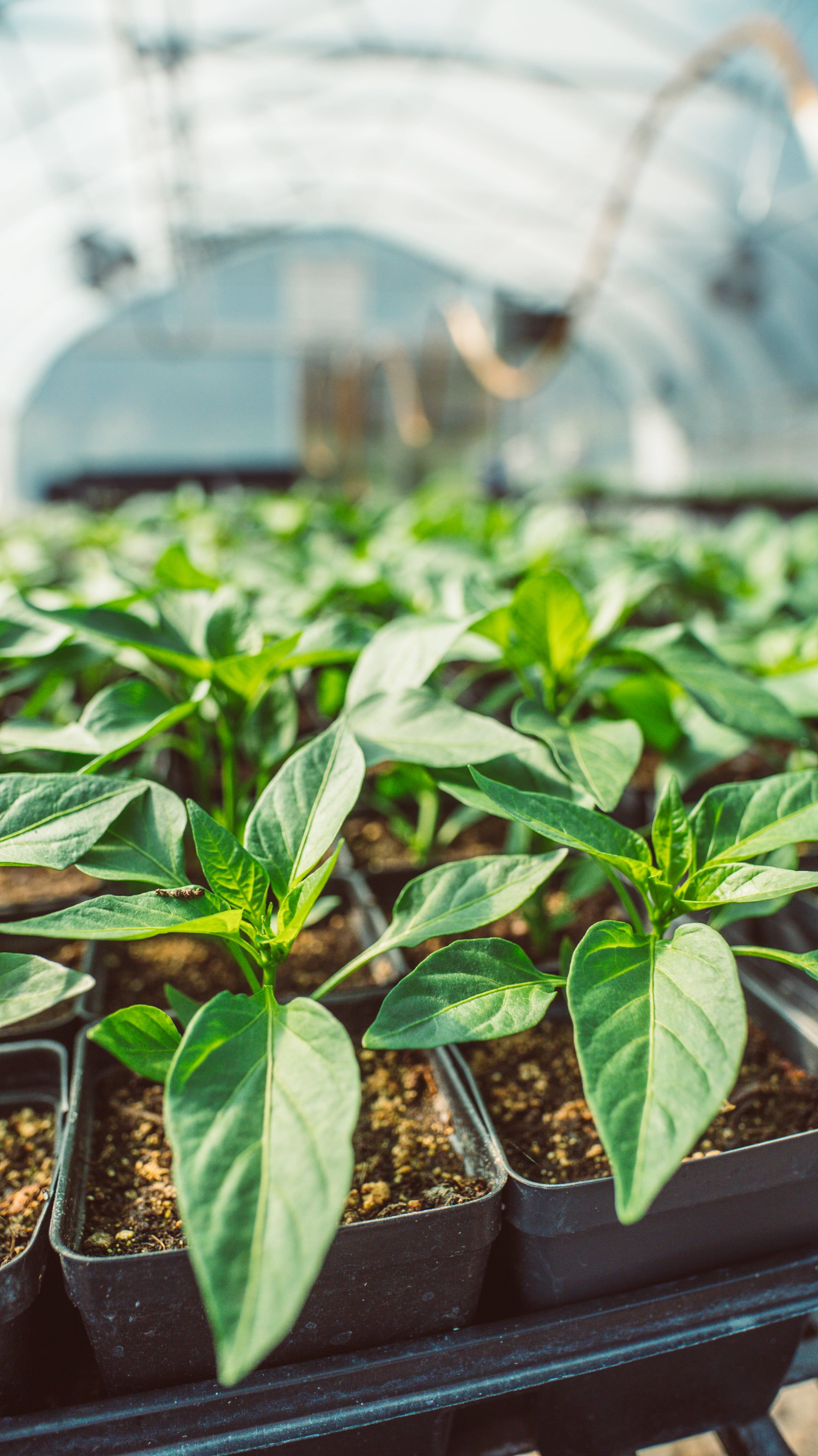
“If it's something really unique that I'm excited about, I'll tell chefs the story behind it,” he says. “But storytelling is not part of my marketing, because chefs don’t need or want it. I definitely don't suggest how to cook stuff for them. I let the products speak for themselves, and then they're inspired to do what they want with it.”
“As a former chef, what do you like to cook for yourself?” I ask.
“Eating the food [from the farm] is a big high,” he says. “I'm sure you guys have experienced freshly picked food, with no refrigeration, but there's a specific taste and vibrancy that you don't get even with stuff that you bought at a farmer's market that was picked a couple days ago, because that was still placed in a walk-in. It's very different to go outside, harvest what you want to eat for dinner, and start preparing it 20 minutes later. And that's what I get to do every day.”
We walk outside, into the fresh air. “I just love food and cooking,” he says.
Dinner is late for Evan. He eats around 9:30 or 10 o’clock at night. He finishes up working on the farm around 6:30, then jumps into business admin work, then prefers to chill out for a bit. “And then, all of a sudden, I realize I haven’t started cooking and it’s 8:00. But I make a good meal.”
He loves meals that center on meat and a lot of vegetables. He’s obsessed with building flavor, he explains. “I use a lot of fresh herbs, and I grow a lot of alliums, but I don't generally make stuff with a lot of spices.” It’s all about coaxing flavor out through preparation.
“Meyer lemon, so versatile,” he says. “You can marinate with it. You can use the zest. Even just having those six months out of the year [with citrus]...that creates its own cuisine in a way. And when they're not available, I'll use vinegar instead, and I'll go buy some lemons.”
He gestures to the fields and high tunnels. “A lot of my flavors come from stuff out here.”
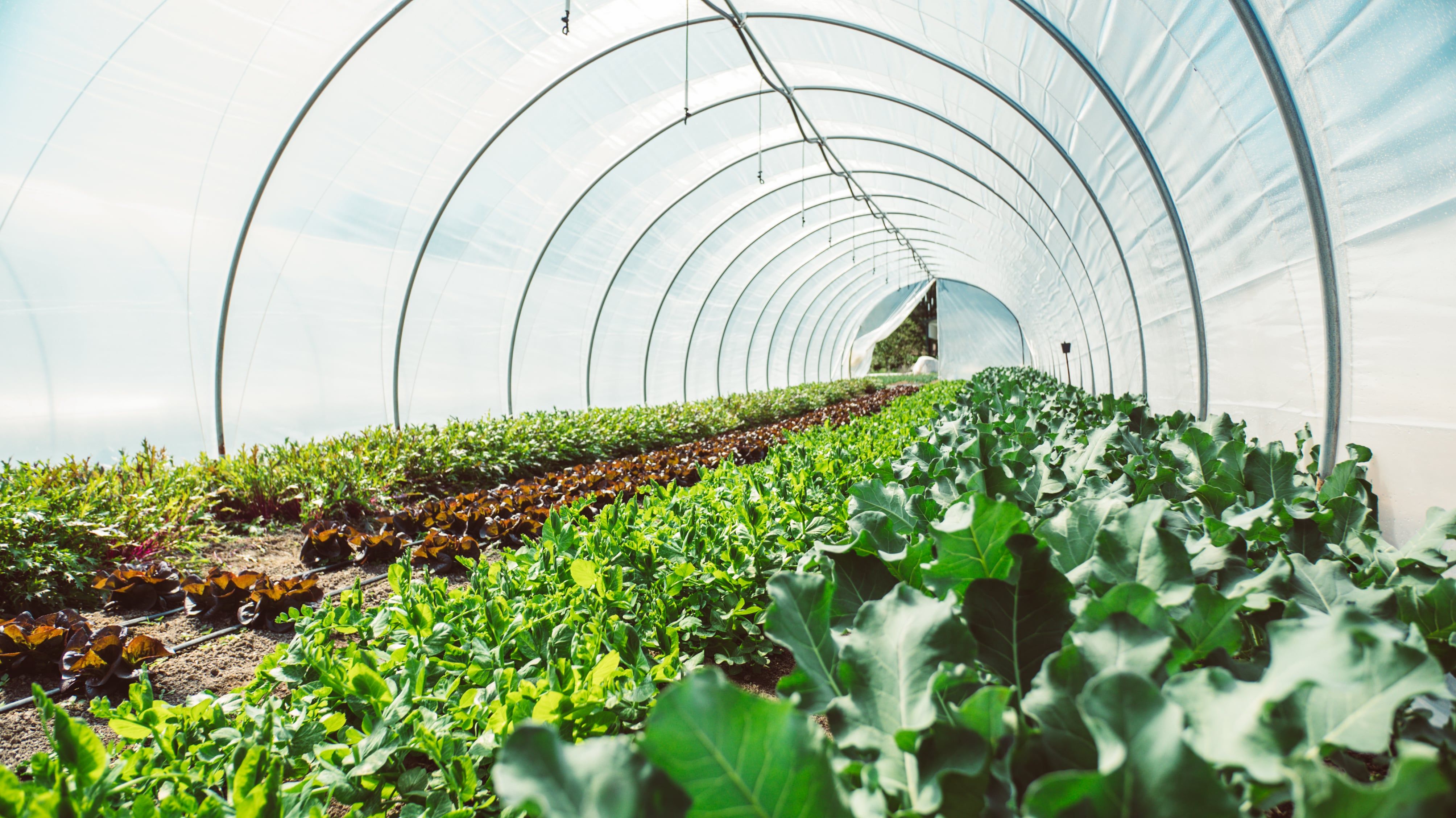
The afternoon shadows are noticeably longer, so we round up to say goodbye to Evan and his team. Lyle and Maple are off to play and explore. The Appalachian mountains that surround the valley deepen in their blue hues as the day comes to a close.
“Farming is the endless challenge,” Evan says. “That's why I'm really attracted to it. I want to be the best, do the best, and I'll never feel like I'm doing the best in farming, because you can always do better, and be more productive, and be more skilled. You'll never know it all in a lifetime…that's why I'm so into it.”

Follow Evan, the “weens” Lyle and Maple, and the farm team over at The Culinary Gardener.
all photos by Donnie Bishop
